All set for 2021: Learning from the pandemic-hit 2020
This time last year, we were busy drawing up a resolutions list—things we wanted to do, goals we wanted to accomplish, places we wanted to go, and changes we would like to make in our lives—determined to make 2020 better than 2019 and not let the latter bleed into the former. As desperate as we are to cut ties with 2020, pretend like it never happened, many of us have allowed it to set the theme for 2021. The lessons it has taught us are crucial.
Nayana Amatya Rajbhandari, chief operating officer at Knowledge Holding International Pvt. Ltd., says her action word for 2021 is ‘try’.
She will ‘try’ to be more flexible—with her plans, how she deals with family, and her daily work schedule. She will ‘try’ to cook more of what her family likes but also ‘try’ to spend less time doing so. She will ‘try’ to be more in the present. She will ‘try’ to be less stressed.
_20210101140348.jpg)
The past year has made her realize that while she can juggle multiple things simultaneously—home, work, children—there’s no way she can stay on top of her responsibilities all the time. The best she can do is cut herself (and others) some slack and try to be a better version of herself.
2020 seems to have brought about a drastic shift in perspective. It has changed how we view ourselves, our lives, and the world around us. For many, resolutions this year come from lessons learnt in the past 10 months or so. And for many of these are inward-focused rather than goal or ambition driven.
There’s always a bright side
For Sunaina Saraf, co-owner at Innovations, an interior designer firm, 2020 was a year of incredible inner strength and positive energy. Most people, she says, might remember 2020 for the losses they have incurred but she’d like to think of it as a year that showed her many strengths.
“The past year has taught me to be kinder to people I work with and show more empathy,” she says adding that her one-to-one dealings with people, compared to group meetings earlier, have changed interpersonal dynamics.
Saraf has also started seeing life a little differently. Today, she strongly believes something good can come out of every situation and she is learning to harness this powerful energy. She isn’t denying that there will definitely be fear and uncertainty in 2021 but she is ready to handle whatever new challenges the year might bring.
Ankeet Rajbhandari, who works at a life insurance company, says despite all the negativity of 2020, he too would like to focus on the positive aspects. In hindsight, the year taught him the importance of being disciplined, focusing only on what’s necessary thus letting go of little things, and the value that’s in being surrounded by family.
_20210101140342.jpg)
Don’t dwell on what you can’t change
Some people APEX contacted for this story were hesitant to talk about their 2020 experience. They felt their views and stories didn’t matter when the world was reeling under such catastrophe—with many people losing their loved ones, jobs, and simply struggling to survive. Having had the luxury to stay at home and not having to worry whether the lockdown would take away their livelihoods, they felt their issues were trivial and thus not worthy of being talked about.
But life has indeed been difficult, for all of us. In our own ways, we have suffered and felt lost as we grappled with the circumstances. Mental health issues have reared their ugly heads. Most of us have had to contemplate and rethink our priorities and goals as well.
Smriti Nepal, who lives in Sydney, Australia and has a doctoral degree, was supposed to get married in 2020. She was to spend three months hosting her beloved niece during her holidays. And her family were to be together to ring in the new year. None of these things happened. Each cancelled plan, she says, was accompanied by crushing disappointment.
“My biggest learning has been to not dwell on what I can’t change. Of course, I always knew this but 2020 gave me the opportunity to practice it. This mantra also keeps anxiety at bay,” she says.
Sneha Koirala, founder of the lifestyle brand Studio Sarcastic, says 2020 put life on hold but she also got the chance to reorganize her plans. She could finally do things she had wanted to for a long time but kept putting off for one reason or another. Turns out, all she needed was some time to gather her thoughts and courage.

Embrace change and live in the moment
What’s amazing is that despite all that 2020 has thrown our way, quite a few have managed to keep their faces to the sunshine. As trying as the year was, 2020 has taught us some invaluable lessons.
One of the biggest has been staying focused in the present and learning to take things one day at a time—which, many confessed, they didn’t do prior to the pandemic in their haste to accomplish one task or goal after another.
Pavitra Rana, program officer, FAITH, a non-profit organization working for socially marginalized and vulnerable populations, says Covid-19 might have put a halt to many of her plans but she has come to the realization that sometimes it’s okay to sit back and see how things unfold in your life rather than rushing into things just so you do them at the ‘right’ time (or as per the status quo). Keeping that in mind, she intends to let life take its course and be flexible in her approach to living in 2021.
“This year, I’d like to not be attached to anything—be it plans, dreams, or other materialistic pursuits,” she says. If there is one thing 2020 has made clear, she says, it’s that things will not always go according to your plan and you need to be okay with that.
Rajbhandari also feels 2020 has taught us to embrace change and learn to adapt to it and do so swiftly. This mentality, he believes, will help him tackle challenges more easily and efficiently this year.
One of our intrinsic flaws has been our inability to go with the flow. We plan and we expect everything to fall into place accordingly. It rarely does. And it’s never been more apparent than in 2020.
From now on, Rupam Shrestha, who works at Sipradi Trading, intends to have long term projections as well as short term goals. This, he believes, will help you to maintain focus and direction when things aren’t going as you expected them to.
Isha Karki, assistant brand manager at Rohto-Mentholatum Nepal, swears she will always have a plan B—because you never know when you might need it.

Connections and kindness
For Alok Thapa, senior radio program producer and presenter at Hits FM 91.2, the year 2020 was of prioritizing what mattered. Thapa is glad he got to spend quality time with his parents, listening to their stories of ‘old’ Kathmandu. He also connected with his neighbors—something he wishes he had done sooner.
“I think 2021 isn’t going to be any less challenging. It will still require a lot of prioritizing and patience. But after a year like 2020, I feel nothing is off limits,” says Thapa.

2020 has forced us to slow down. And in doing so, we have had the opportunity to realign our lifestyles with our values. So, taking care of one’s mental wellbeing, learning to live with less, and finding balance between home and work seemed to be the top three resolutions for the new year. The focus is more on ‘being’ than ‘having’.
A US-based Nepali medical doctor, who saw Covid-19 claim many lives, says that 2020 has made it evident that life can change in the blink of an eye and that sometimes there is nothing you can do about it. Faced with the fragility of life, you are bound to reconsider all that you believe to be true and let go of grudges. Be a little kinder than necessary, if you may, she says.
According to Nepal, the Sydney-resident who works in drug prevention/mental health research, 2020 has shed light on the importance of connection and resilience. In 2021, she hopes to be a better daughter, partner, sister, and friend. This, she says, comes from the fact that she couldn’t see many of her family and friends in the past year.
Prita Malla, mother, wife, and business analyst at Spire Energy, a public utility holding company based in Missouri, US, wants to be more mindful of her actions and live each day to the fullest while making self-care her number one priority.
“I think we have to accept that this coronavirus is here to stay and tweak our perspective of what’s ‘normal’. We must also let go of what’s not in our control and focus on things we can change. That’s the best way to move into the new year,” she concludes.
Mismatched: A cute, fun story
Don’t listen to your friends. Mine told me to watch ‘Mismatched’ on Netflix. I did and now, the story is stuck in my head and I can’t get it out. The second season of the series hasn’t been announced yet. Though the producers are likely to do so in the near future, thoughts like “What if they don’t?” and “How long do I have to wait?” are slowly sucking the air out of my universe. The six-episode first season ended on a cliffhanger.
Released on Netflix in November 2020, Mismatched, written by Gazal Dhaliwal, is based on Shandhya Menon’s 2017 young adult novel “When Dimple Met Rishi”. In the rom-com, a girl and a boy are set up to meet (and eventually get married) by their families. The girl, Dimple Ahuja, doesn’t want to “settle down”. She is intent on building her career. However, when she meets Rishi Singh Shekhawat, at a three-month coding program she is enrolled in, the two become friends and eventually fall in love.
The premise is simple. It’s every other rom-com you have ever watched: Boy meets girl, they fall in love, but then there’s a conflict to spice things up. But what makes Mismatched different is definitely the cast. I liked the actors and their interpretations of their characters. They are all believable and charming in their roles—even the annoying ones.

Dimple, played by one of India’s most popular YouTubers, Prajakta Koli (you might have heard of mostlysane) is fascinating and frustrating at the same time. You see yourself or your friends in her, and then you don’t. You love her, and then you hate her. She is every girl.
It's hard not to be smitten by Rishi—the dashing Nepali actor Rohit Saraf who has been a part of movies like ‘Dear Zindagi’, ‘Hichki’, and ‘The Sky Is Pink’. He is gentle, soft-spoken and kind. He is the friend you want, and the boyfriend you wish you had.
In the role of Professor Sid is actor, MTV VJ, and host of the popular reality show Roadies, Rannvijay Singh. He shines in his role of a sarcastic, no-nonsense teacher who believes in being strict to push his students to be the best versions of themselves. Even if that means he is misunderstood and feared.
And, remember Vidya Malvade who was the captain of the Indian hockey team in the Shahrukh Khan-starrer ‘Chak De India’? In Mismatched, she is a 41-year-old widow trying to start a new life and is back at school. As Zeenat Karim, she is adorable and you wish she had been given more screen space.
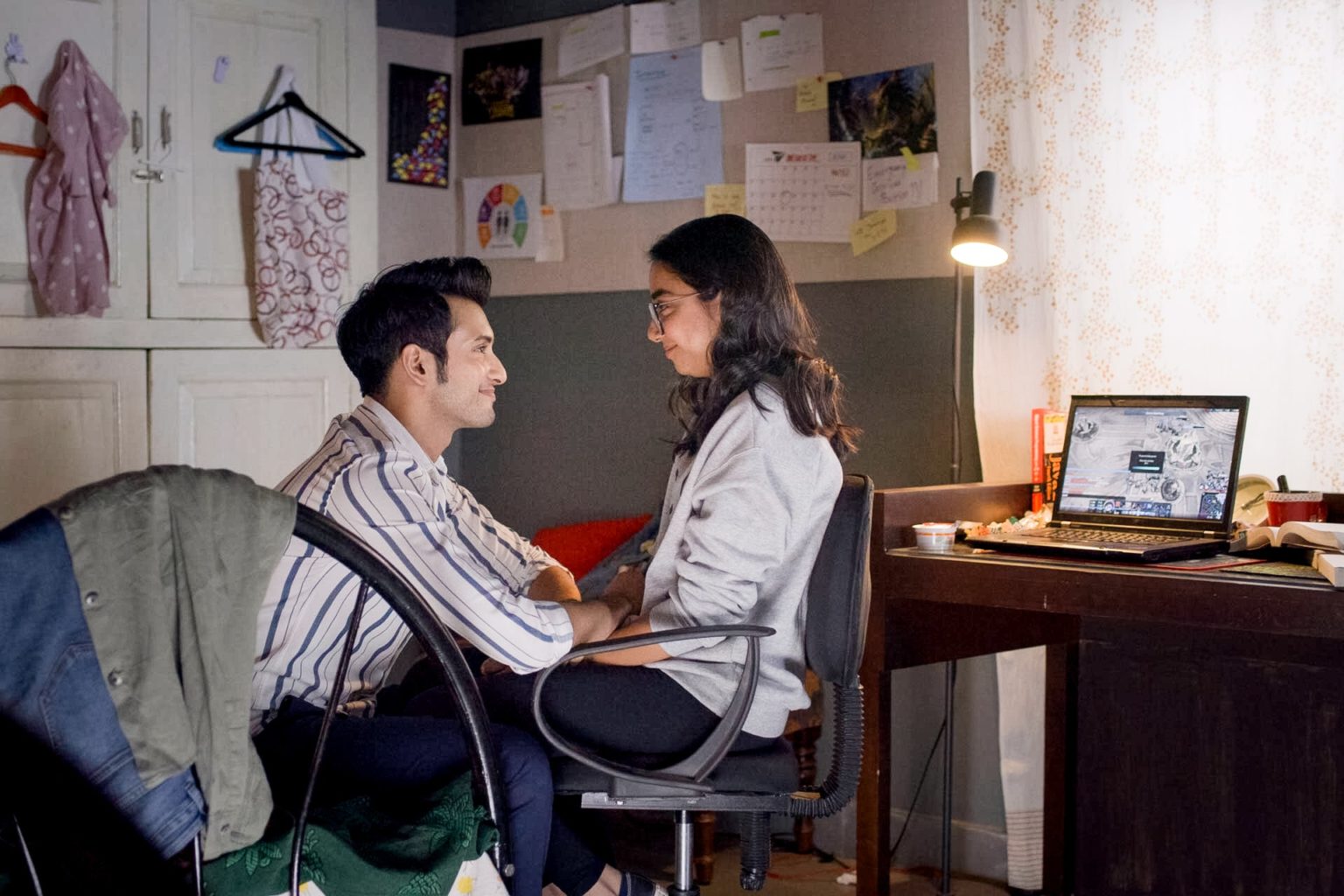
Mismatched touches on a few critical issues but doesn’t do any of them justice, choosing instead to focus on Dimple and Rishi and their love story. In doing so, it misses out on telling stories—of a closeted lesbian, and a guy suffering from alopecia, for instance—that could have started important conversations. There is a lot of potential for that, with actors and characters who could have pulled it off with ease. There are also a few glitches and oops moments in the storyline—wrinkles that neither the writer nor the editor thought of ironing out.
However, Mismatched is as entertaining as entertainment can get. With short episodes, you could watch the entire first season in a single afternoon. But be warned, you will spend the rest of the weekend wishing there were more.
Rating: 3/5
Genre: Rom-com
Actors: Prajakta Koli, Rohit Saraf, Rannvijay Singh, Vidya Malvade, Aditi Govitrikar
Director: Akarsh Khurana & Nipun Dharmadhikari
Run time: Six episodes of 30 minutes each
Fostering a reading culture in Nepal
The lockdowns amidst Covid-19 pandemic had the world hoarding toilet paper. Many families now probably have enough to last at least a couple of years, if not a decade. Apparently, quite a few avid readers in Nepal bought books just as frantically. Those in the book business say many Nepalis seem more inclined to read today than ever before.
“There was a time when only tourists would buy books. Bookstores didn’t appeal or cater to Nepalis,” says Daya Ram Dangol, owner of Book Paradise in Jamal, Kathmandu.
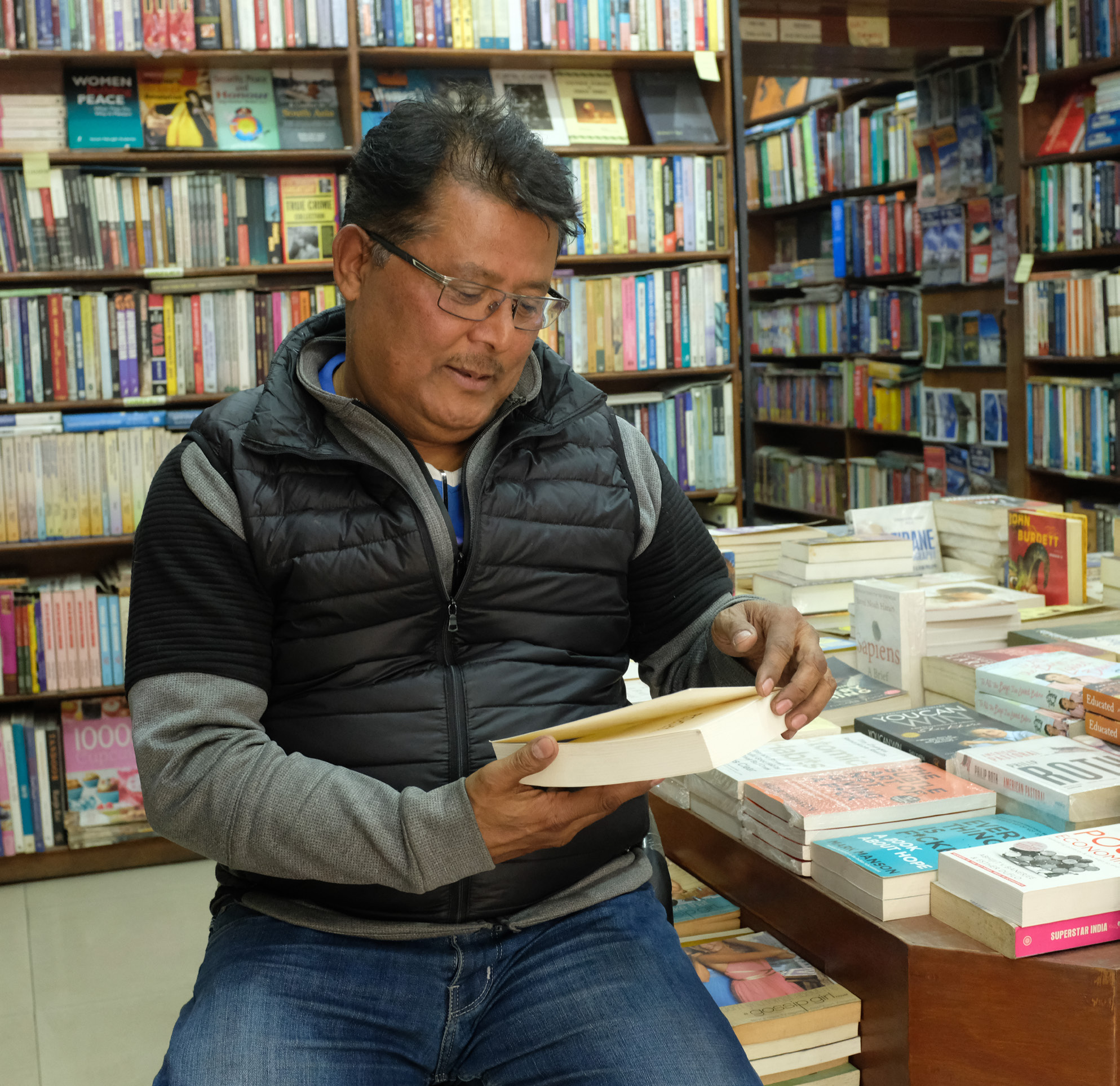 Daya Ram Dangol, owner of Book Paradise in Jamal, Kathmandu
Daya Ram Dangol, owner of Book Paradise in Jamal, Kathmandu
Dangol has been in the book business for over 45 years. When he started, he says, the bookstore he worked at only sold travel books—mostly on Tibet, Bhutan, India—photo books, and a select few coffee-table books.
Things, he says, have definitely come a long way with over 95 percent of his customers today being young Nepalis who, according to Dangol, have varied interests.
“I rarely get foreign customers today. There was a time when the entire business depended on them,” he adds.
He feels this change in the reading scene in Nepal can, to a large extent, be credited to the internet. People these days know about new releases in the market. It isn’t like before when you would have to go to a bookstore to find out what was available.
Siddhartha Maharjan, manager at Mandala Book Point in Kantipath, Kathmandu, highlights the media’s role in making books popular and reading trendy in recent times.
“A lot is being written in the print media about literature these days and that gives books and authors the visibility they deserve,” he says.
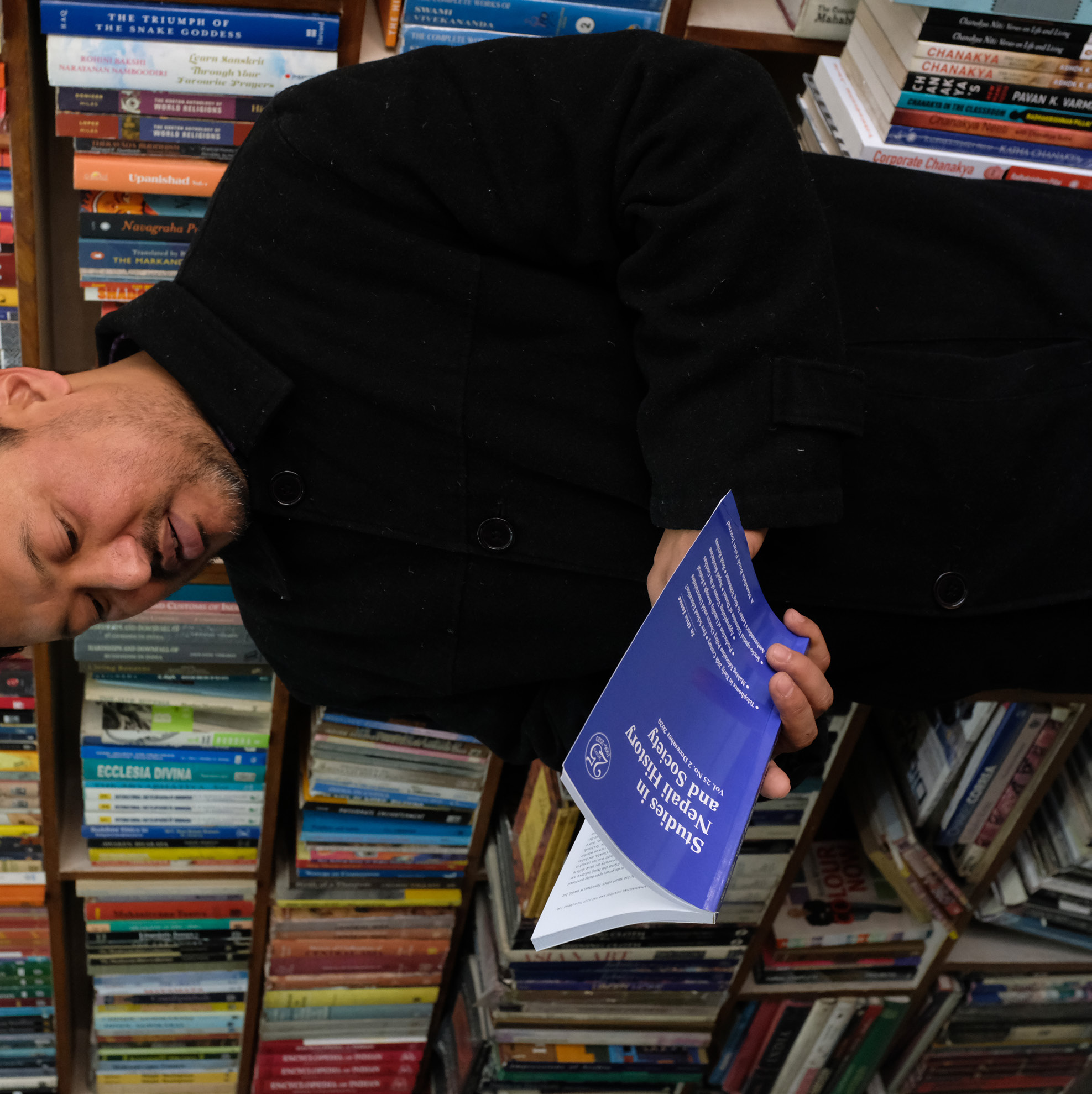 Siddhartha Maharjan, manager of Mandala Book Point, Kantipath, Kathmandu
Siddhartha Maharjan, manager of Mandala Book Point, Kantipath, Kathmandu
Maharjan, however, says that Nepal doesn’t have a thriving reading culture—not yet. Most people, he says, read just the bestsellers or books that come highly recommended, be it by friends or on social media.
Like most good habits, a reading habit isn’t something that can be cultivated overnight. And like most habits, the earlier you start reading the better, says Maharjan.
In this regard, schools can and have been playing an important role by giving children reading assignments. But most parents themselves buy the prescribed books for their children—on their way to work or back home. According to Maharjan, there aren’t many parents who actually bring their children to the bookstore and let them pick books.
“This concept of letting kids explore a bookstore is missing here in Nepal and that is what is hindering the development of a reading culture,” he says. Only when children go to bookstores to find a particular book and then come across something else they like, Maharjan adds, will they eventually start reading on their own—not because they have to, but because they want to.
Radha Sharma Rai, senior sales manager at Ekta Books, says they have a rather large children’s section with a kid-friendly setting at their bookstore in Thapathali, Kathmandu. The intent is to get parents to let their kids roam around and discover books. She says she sees many people, who themselves grew up reading, bringing their children and letting them choose books on their own.
Besides cultivating a lifelong reading habit, bookstore owners APEX talked to said that Nepalis, in general, are definitely reading more than ever before—even if it’s a one-off popular book or pop-fiction by Paolo Coelho, Nicholas Sparks, and Chetan Bhagat.
While the older generation seems to prefer books on politics and economy, young Nepalis, they say, are mostly reading about personal development, businesses and startups, and spirituality. But the one genre that apparently sells across ages and interests is biography. With every other celebrity and politician talking about their lives, there is always some book selling like hotcakes.
The Covid-19 pandemic didn’t harm the book business. Rather, as bookstores took to Instagram and other social media platforms to showcase what they had in stock, their businesses actually did quite well. Granted, they had to tweak their business modules a bit but things have pretty much worked to their advantage.
“People these days want to know things. They want to be better versions of themselves. They want to develop new skills. And they realize reading books on topics they are interested in is a great way to do all that,” says Dhan Bahadur Lamsal, proprietor of Fewa Book Shop in Lakeside, Pokhara.
Pratima Sharma, who looks after online sales and marketing at Nepal Mandala Book Shop, also in Lakeside, says people turn to books looking for solutions to issues they might have. And it helps that we now have access to a variety of books, she says.
 Pratima Sharma, online sales and marketing officer, Nepal Mandala Book Shop, Lakeside, Pokhara
Pratima Sharma, online sales and marketing officer, Nepal Mandala Book Shop, Lakeside, Pokhara
“I see a lot of people gravitate towards recent releases, poetry, and self-help,” says Sharma, adding that there seems to be a keener interest in books today as compared to, say, even five years ago.
But ours isn’t a conducive environment for promoting a reading culture, she laments. Books, she says, don’t come cheap. An avid reader herself, she confesses she probably wouldn’t have had access to or been able to afford many books if her parents didn’t own a bookstore.
Nor do we have good libraries in Nepal. This, Sharma says, not only increases piracy but also makes people search for other, cheaper or free, means of information and entertainment.
“The few libraries that we do have, have old books that are usually falling apart. Unlike in other countries where libraries get plenty of copies of new releases, libraries here run mostly on donated books,” she says.
If every Nepali city were to have at least one well-equipped library then that would mean even those without the means to buy books could take to reading. Sharma thinks the government should look into this. After all, in the long run, a robust reading culture helps create a society of smart individuals which could in turn foster prosperity and development.
There is also no concept of sharing books among readers in the community in Nepal. In many parts of the world, Little Free Library, a non-profit based in the United States, promotes neighborhood book exchanges. The aim is to increase access to books for readers of all ages and backgrounds. Communities here could also work upon a similar idea to get more people reading.
For now, Dangol at Book Paradise thinks easing the import process and not levying heavy taxes on books could help in making books accessible to all. Lamsal of Fewa Book Shop agrees. These days our education system supports free thinking and forming opinions from early on. This, he says, naturally has people wanting to read more. Hence, the only caveat to fostering a reading culture is making sure people who want to read have the resources to do so.
Why are Nepali women delaying childbirth?
Babies are beautiful. On Instagram.
In real life, it’s drool and dirty diapers. It’s a messy house where you are forever stepping on rattles and legos. It’s ‘I-will-quit’ threats from your house help if she has to clean a kitchen that resembles a war zone one more time.
Some women have “jokingly” called parenting modern-day slavery. You are, after all, at someone’s beck and call 24/7. So, most women feel babies are a bliss as long as they are someone else’s, and are choosing to wait a few years after marriage to have their own.
While the reasons were plenty and varied, a major one behind women choosing to have babies later in life was the need to first focus on their careers and be financially secure before taking up an additional, lifelong responsibility.
Many women confessed feeling weighed down by the mere thought of having to juggle home and work responsibilities besides being put off by the concept of having a timeline for everything in life.
Kritishma Karki, 36, executive director at SAATH, doesn’t like how life is supposed to unfold in stages. There is the pressure to get married at a certain age which will automatically lead to the pressure to have children, she says.
 Kritishma Karki
Kritishma Karki
“Having a child shouldn’t be about ‘I have to’ but rather about ‘I want to’,” she says.
Bandana Shah, 28, who has been married for less than a year, likes the idea of having and raising kids. She just doesn’t think she and her husband are currently ready to take on such a huge responsibility.
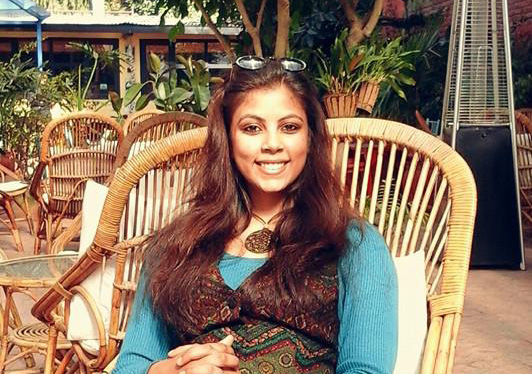
Bandana Shah
“We want to make sure we are capable of giving our child a good life. For that, we need to be financially secure first,” she says.
The couple has conveyed this to their parents and they understand. In fact, Shah’s stepmom actually tells her to enjoy married life for a few more years and only have kids in her mid-30s.
Shah works as content specialist at Shuraa Business Setup in Dubai and feels being away from home spares her from invasive personal questions.
Why is sex everyone’s business?
Not everyone is as lucky. Most Nepali women, even if they live abroad and don’t have to deal with nosy relatives on a daily basis, are coaxed into getting married and then having a child immediately thereafter.
Sneha Bhandari, 31, director of health informatics, Aegis Medical Group in Orlando, Florida, is often at the receiving end of comments like: “You are getting old, time for kids now”, and “Your parents are getting old. If you have one now, they can help you raise your child.” For her, it’s frustrating that sex is generally such a taboo but as soon as you get married, it becomes everybody’s business.
 Sneha Bhandari
Sneha Bhandari
“What if you have a child and then realize you are not made to be a parent?” she muses.
Most women APEX spoke to had similar concerns. They didn’t know if they were cut out or ready to be parents. To raise another human being requires dedication and a lot of effort, never mind round-the-clock vigilance, at least in the early years. It also means changing priorities and lifestyles. The unanimous opinion was that one has to be mentally, emotionally, and financially ready to have children.
But people don’t understand that, says Prerana Dhakhwa, 34, an HR professional. She says most have this stringent preconceived notion on how life must be lived and see children as a mandatory part of that “ideal life”.
 Prerana Dhakhwa
Prerana Dhakhwa
“There have been family members who have assured me that they will help me raise my children. All I had to do was give birth,” she says.
As enticing as that sounds, it’s not entirely feasible. Earlier, in joint family settings, bringing up children was relatively easy. There would always be someone to look after them. But with the number of nuclear families on the rise, parents are now the primary caretakers of their children.
While Dhakhwa wants to have children of her own someday, she says she definitely won’t do so under family or social pressure.
Other options open
Family pressure seemed to be a big reason why women who might not want a child now (or ever) were contemplating getting pregnant. Of the 60 women we questioned, 43 said they would be okay with not having children or adopting one later in life if their parents and in-laws weren’t pestering them for grandkids.
Supriya Pradhan, content writer and voiceover artist who got married in her late 20s, says every family function has felt like an ambush of sorts after she turned 30 a few years ago. Pradhan understands that some of her relatives are genuinely concerned. Years down the line, they want her to have someone to look after her—just like they have their children to look after them now. But she feels there are many factors to consider before having a child and you cannot only see it through a cultural lens.
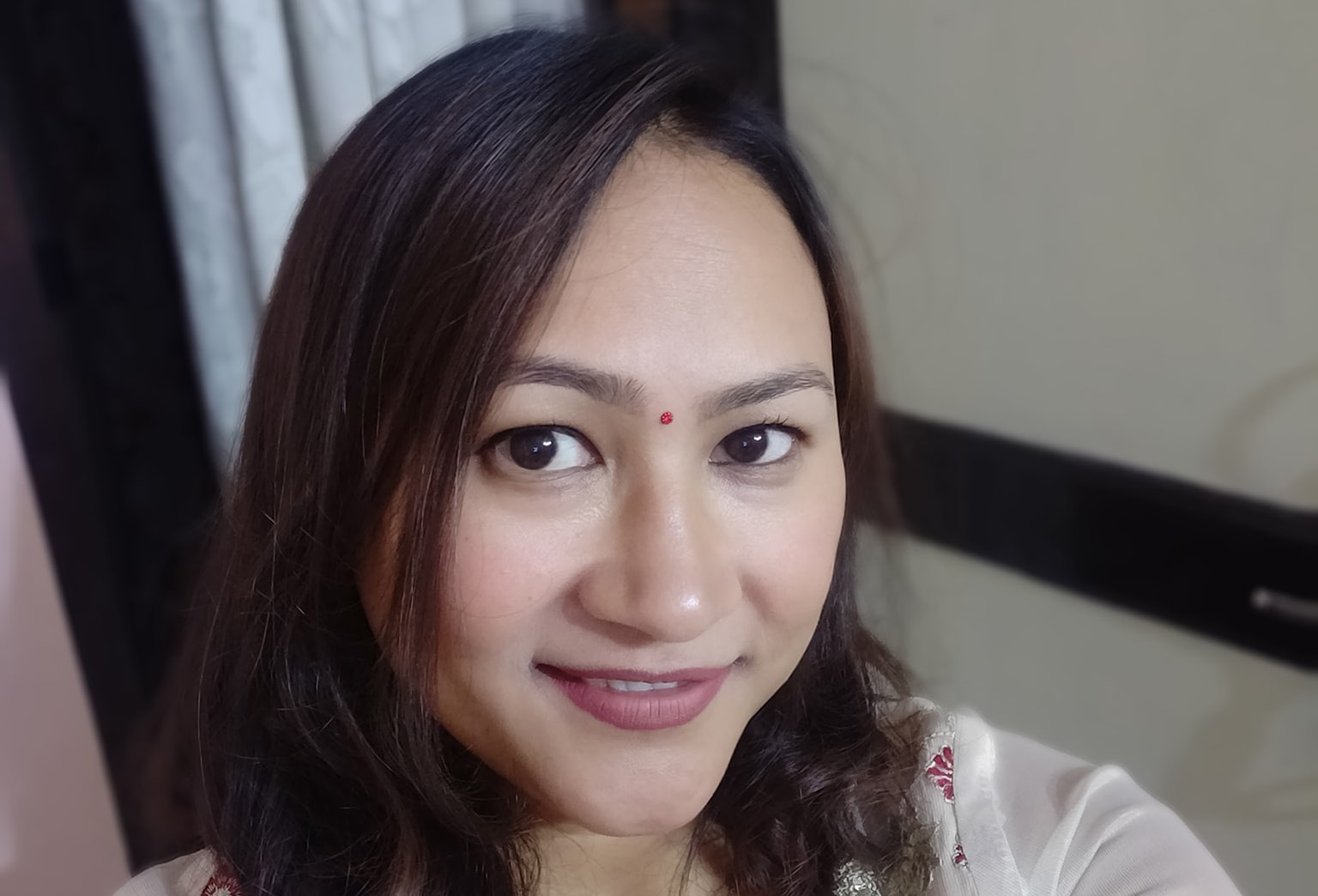 Supriya Pradhan
Supriya Pradhan
“I believe there is a right time. A lot of things like your emotional state, health, and finances determine that time,” she says.
Pragya Sitoula, 35, a resident of Pennsylvania, US, has similar views. Married for seven years, she has had more than a fair share of pressures to “start a family”. Now, she says, people wonder if either she or her husband have health issues preventing them from conceiving.
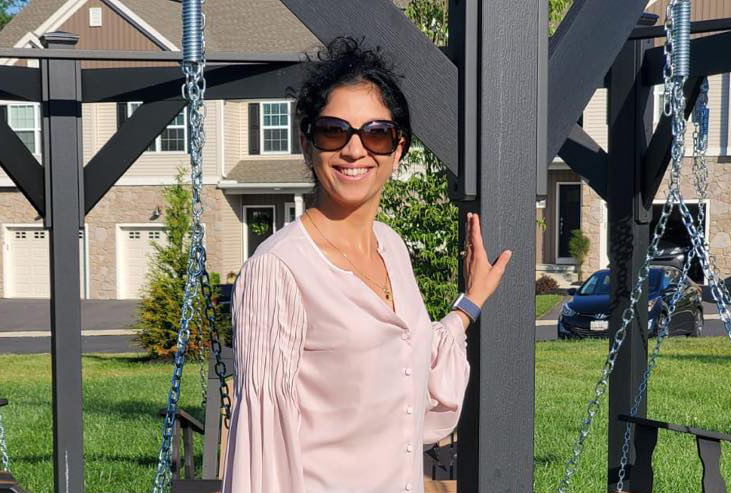 Pragya Sitoula
Pragya Sitoula
However, Sitoula is on the fence about children. On one hand, she sees photos of cute babies on Facebook and Instagram and that makes her want to have one. On the other, the thought of additional responsibilities a child bring along stops her from making any rash decisions.
“A major factor for me is job stability and security, at least for one person in the household, before I even think about having a child,” she says.
Rosha Basnet, 33, journalist and Everest summiteer, says she wants to be a proud mother of at least three or four kids if she achieves one of her primary goals: financial freedom. This, she believes, will allow her the luxury of time and she could then better attend to the duties as a parent.
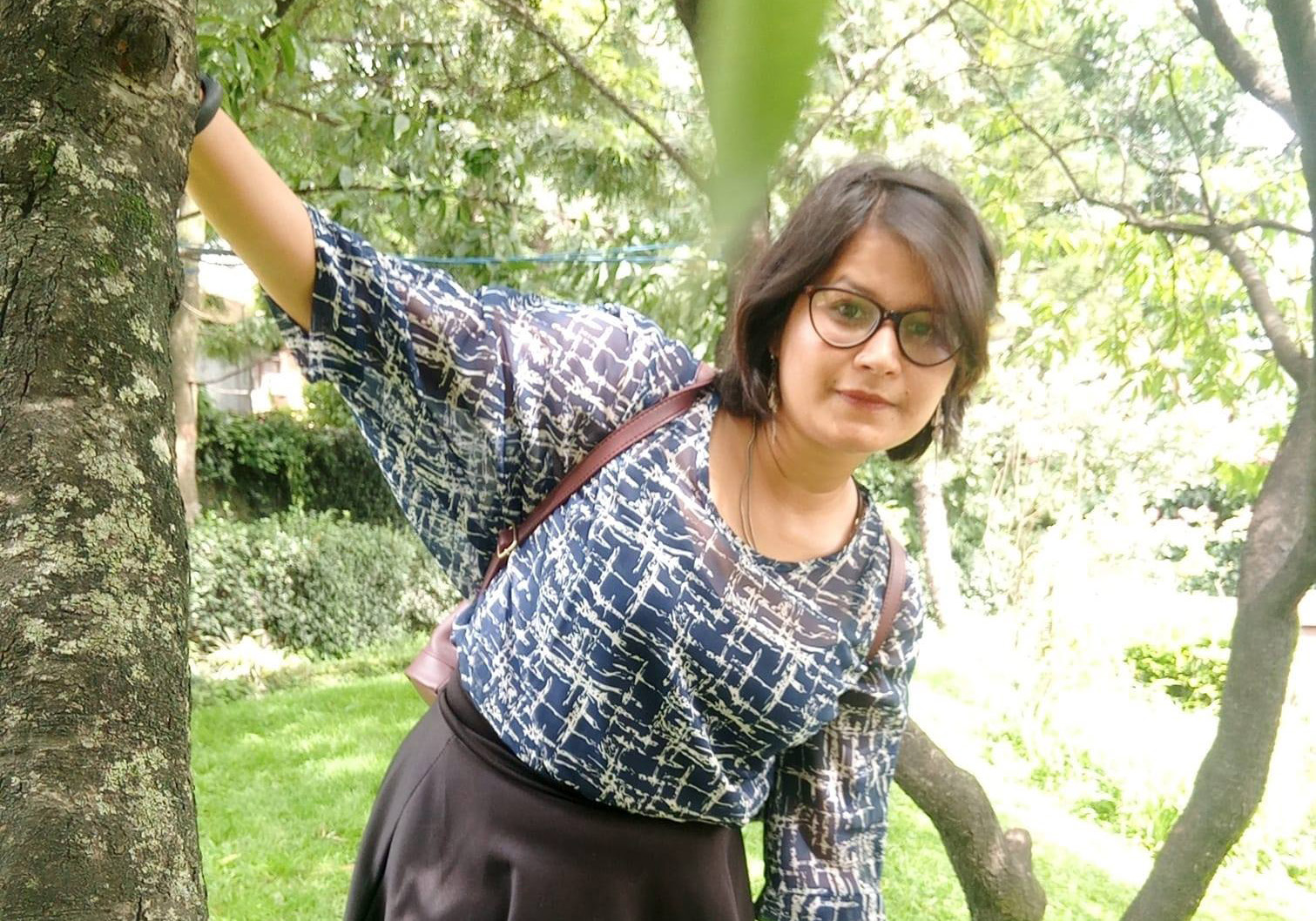 Rosha Basnet
Rosha Basnet
Costs—and benefits
Complications in late pregnancies—like preeclampsia, fetal growth restriction, and spontaneous preterm birth—and the thought of slowly running out of childbearing years, make many women consider taking the plunge. But advancements in medical technology (you can now freeze your eggs), and the option of adoption help allay some of their fears.
Though having a baby in their 20s might be a safer option, conceiving in their mid- or late-30s definitely has its own perks, say most women APEX spoke to. One of the biggest plusses is you develop patience and confidence with age and are thus likely to be better parents.
Dhakhwa says having a baby with the right partner and with proper resources matter as much as having a baby at a safe reproductive age. If that means having her first child when she’s in her late 30s, so be it.
Bhandari, too, will have a baby on her own terms. She wishes people would understand that we have different priorities in life and not all of us want the same thing.
Likewise, Pradhan also doesn’t consider having a baby an obligatory part of married life. Shah wants a kid before she is 30 for health reasons and also because she has heard breastfeeding reduces cancer risks (she lost her mother to breast cancer). But the thought of the enormous amount of energy she would require to juggle home, work, and children makes her reconsider.
While families and the society expect pregnancy to follow marriage in quick succession, women, of late, are choosing to take their time and only have a child when they feel secure enough to take care of one. It’s not like adopting a pet, they say.
Dixa Thapa, 36, MD, Everest Hitech, a trading company, says she chose to have a child almost four years into her marriage—when both she and her husband felt they wanted one.
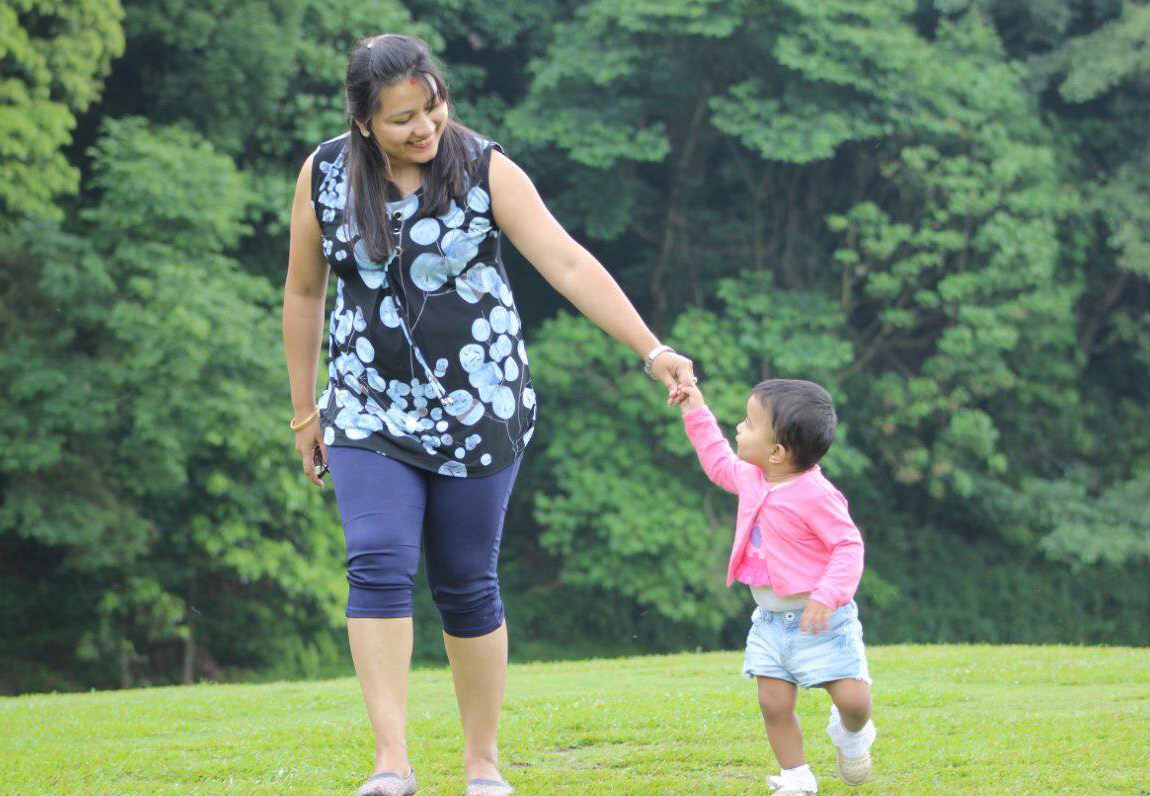 Dixa Thapa
Dixa Thapa
“Motherhood is beautiful. But you shouldn’t have a child unless you are ready for it because ultimately s/he is your responsibility. There might be lots of people willing to help you or so they tell you, but when your child poops, pukes or cries, s/he will automatically end up on your lap,” she says.
Dealing with a loved one’s mental health problem
A 55-year-old medical doctor, who wishes to remain anonymous, asked her husband, also a medical doctor, to see a therapist. He, she says, was getting increasingly moody and angry. His behavioral changes made her suspect something was not right and she wanted him to seek help.
But her husband felt insulted by her “insinuation that he was crazy”.
“This is how many of us still perceive mental health in our society,” she says. “If doctors can’t accept mental disorders as health issues that need some form of intervention, then what hope is there for the rest?”
But psychiatrist Dr Arun Raj Kunwar says there is light at the end of the tunnel. He says that there is definitely more awareness regarding mental health, especially among the new generation. However, what is needed is greater awareness and acceptance in general.

“No one likes being sad, anxious or agitated. But it’s a disease, one you have no control over, just like any other biological issue you may have. That’s the bottom line that most people are yet to understand,” says Dr Kunwar.
Kirti Agarwal, counseling psychologist and lifestyle coach at The Blissful Mind, says not many people are aware of the symptoms of mental disorders. Most behavioral changes—in themselves and those around them—are attributed to habits or stress. This is perhaps what makes mental health problems so difficult to diagnose and treat.
 Kirti Agrawal
Kirti Agrawal
It’s also our collective failure to accept mental illness as any other health ailment that leads to stigma which, in turn, has many people suffering in silence. Tell your family and friends that you have a fever and they will check on you often, but tell them you are anxious and feeling a bit rundown, and they will probably flippantly tell you to relax or, worse, to snap out of it. And then it’s never brought up again.
Lend a listening ear
Meenashi Pokhrel, counseling psychologist, says though it’s very difficult to identify if someone has mental health issues, significant behavioral changes can be a sign that something is wrong.
 Meenashi Pokhrel
Meenashi Pokhrel
According to Pokhrel, as mental disorders can stem from a variety of reasons—from abrupt lifestyle changes and hormonal issues to biological and psychosocial causes—anyone, despite of their lifestyle and circumstances, can suffer from them.
The best way you can help someone struggling with a mental health condition is by being available to just listen to that person. It’s not giving advice, or trying to “talk sense” into them.
“Listening, without judgement, is one of the greatest things you can do for someone who’s not in a good frame of mind,” says Pokhrel. This often has a cathartic effect.
Junu Chaudhary, psycho-social counsellor, agrees and says creating a conducive environment where someone with a mental disorder feels acknowledged and heard often prevents a mild or moderate problem from escalating.
 Junu Chaudhary
Junu Chaudhary
Sometimes, she says, just being able to talk to someone about your problems can help put things in perspective. This is also why therapy is extremely important.
“Not everybody can talk to their family members and friends. It helps to have a third person who you can share things with and who, you know, you can trust to keep your secrets, should you want it to be that way,” she says.
Dr Kunwar adds that not all mental disorders can be dealt with in isolation through therapy but there are 50 to 60 common diseases where evidence suggests that therapy is as good as medicines.
More than mood swings
Chhitiz Kiran Shrestha, counseling psychologist and management consultant, says he is optimistic that the society will in time address mental health issues as any other health issue. The trend of appointing counselors in schools and colleges is a hopeful start. And surprisingly, he adds, during this Covid-19 pandemic, there have been many 50-plus men and women signing up for the counseling sessions that Shrestha has been conducting online.
 Chhitiz Kiran Shrestha
Chhitiz Kiran Shrestha
However, Chaudhary says that there’s still this steadfast denial to accept mental health problems as anything other than mood swings. Some people with mental health issues APEX spoke to confessed that everybody around them kind of expects them to shrug it off and move on.
A 35-year-old woman, who lives and works in Kathmandu, once told her parents she was thinking of seeing a psychiatrist as she mostly felt miserable. Her mother expressed concern but her father told her she needed to make productive use of her time. That was a year ago.
Today, she is undergoing therapy and is on some medications as well.
“My parents don’t know this because they never asked,” she says.
According to Shrestha, that can mainly be attributed to a culture that doesn’t encourage us to freely express ourselves. We are always told to keep our feelings to ourselves, lest they bother others around us. No matter how horrible we might be feeling, our response to the question, “How are you?” is almost always along the lines of “Okay”.
“I believe there will be fewer mental health problems when people are allowed to talk openly about their feelings,” he says.
This was quite evident after the 2015 earthquake in Nepal, he adds, when people could talk about being scared and anxious. They felt they were justified in doing so. That is also what is happening during the current Covid-19 pandemic—people are talking about how they are feeling without the fear of judgement and scorn.
Shrestha says that most people feel the need to have a “valid reason” for their emotions.
“But the thing is if you are scared or sad, you should acknowledge that feeling irrespective of your circumstances. You should be able to express it even when there isn’t a natural disaster or a pandemic to blame it on,” he says.
Agreeing with Shrestha, Pokhrel, the counseling psychologist, adds that the need to be in tune with our changing feelings has never been greater. And, at the same time, we should understand that sometimes our moods are beyond our control.
Time for action
Experts are of the unanimous opinion that we’ve been talking about mental health issues for a while now but with little effect. It’s time to take it up several notches and have these conversations within families, schools, and communities for greater impact.
“Mental health issues don’t just affect an individual. If someone in your family is suffering, everybody will have to deal with the consequences. It creates a ripple effect,” says Agarwal adding that’s why she, at The Blissful Mind, also focuses on counseling the family members so that they are better able to deal with their own mental wellbeing while lending adequate support to the ones in need.
Agarwal says that, most of the time, one doesn’t know how to help, further complicating matters. Apart from recognizing the signs and symptoms of mental disorders, it’s also imperative to understand how you can help someone heal. Not everyone, she says, is looking for the same thing.
So, what’s the right thing to do?
Pokhrel says it’s asking the person suffering from mental health issues what kind of help they need and lending that support instead of doing what you feel is right. Chaudhary, on the other hand, says you shouldn’t try to find a solution but rather listen to what s/he has to say with a non-judgmental attitude. And they both agree that seeking professional help, whenever possible, is perhaps the best approach.
Agarwal adds that government initiatives to address mental health problems and remove the stigma through awareness can also help build an empathetic society; one that is better equipped to deal with something as sensitive and serious as mental health.
Should you put tika when menstruating?
There are days when your survival seems to depend on Meftal-500 and hot water bags. You drink copious amounts of green tea hoping the bloating will subside, and crave sickeningly sweet food one minute and spicy ramen the next. Emptying and sterilizing the menstrual cup for the umpteenth time, you mull over a hysterectomy—end the agony once and for all.
As if out-of-whack hormones weren’t bad enough, there’s all that you can’t do, because you are bleeding, which makes things even worse—especially during festive times.
But, slowly but surely, something seems to be shifting. Women have started questioning these practices.
Shriya Pant, program management consultant at UNFPA, puts Dashain tika even when she’s on her period. She goes to the puja kotha and visits temples too. It wasn’t always like that though. While growing up, she, like most Nepali women, didn’t enter places of worship during her period.
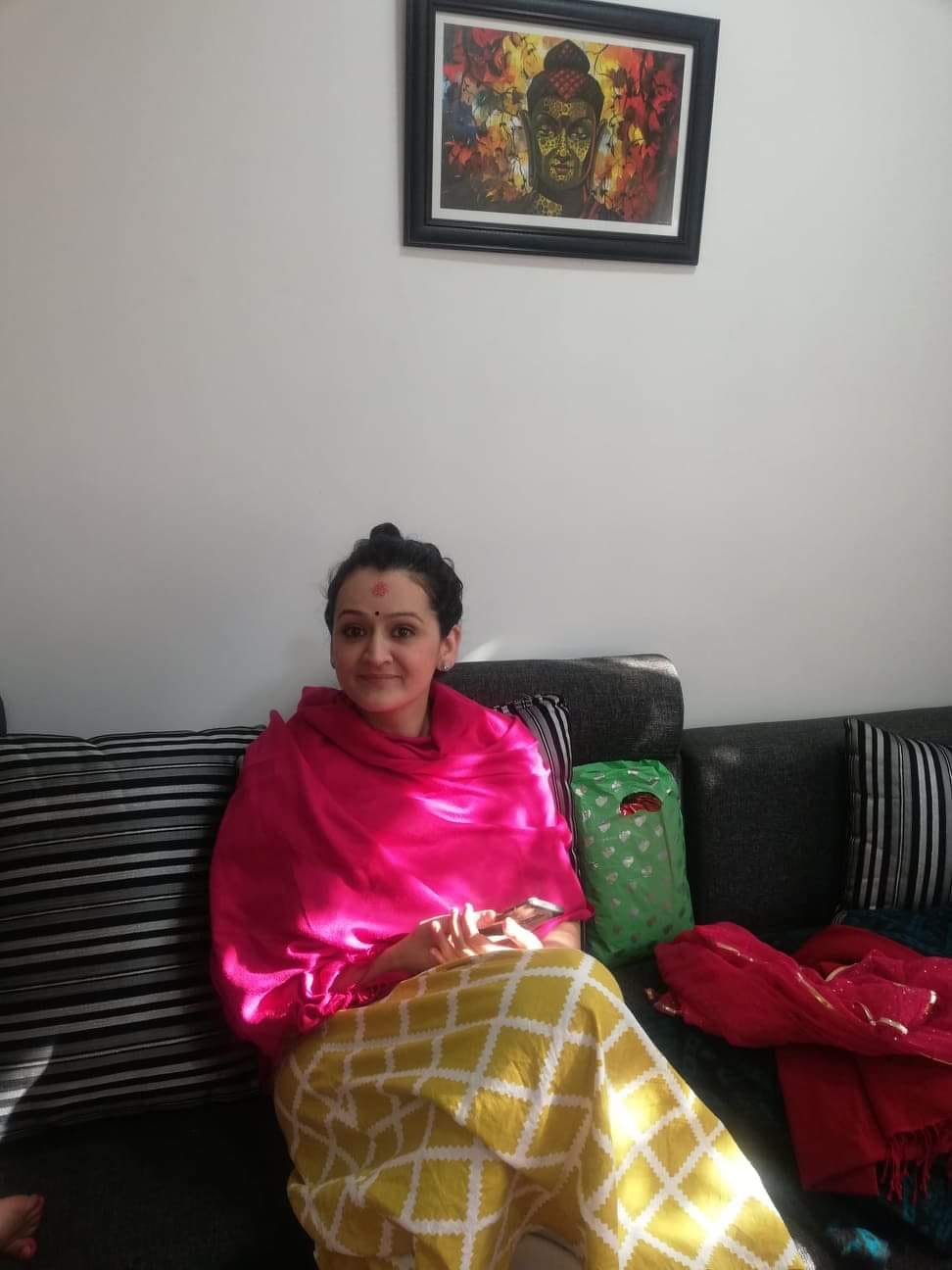 Shriya Pant
“It’s just not right for women to be discriminated against because of a bodily function. These are harmful practices that we, as a society, need to do away with. I don’t follow them anymore,” she says.
Ever since she got married four years ago, Poonam Maharjan, a homemaker and fulltime mother, hasn’t restricted herself from visiting temples, going to the puja kotha, or participating in religious functions while on her period. Last year, she had her period on Laxmi puja in Tihar. That, she says, didn’t stop her from doing the puja herself.
Shriya Pant
“It’s just not right for women to be discriminated against because of a bodily function. These are harmful practices that we, as a society, need to do away with. I don’t follow them anymore,” she says.
Ever since she got married four years ago, Poonam Maharjan, a homemaker and fulltime mother, hasn’t restricted herself from visiting temples, going to the puja kotha, or participating in religious functions while on her period. Last year, she had her period on Laxmi puja in Tihar. That, she says, didn’t stop her from doing the puja herself.
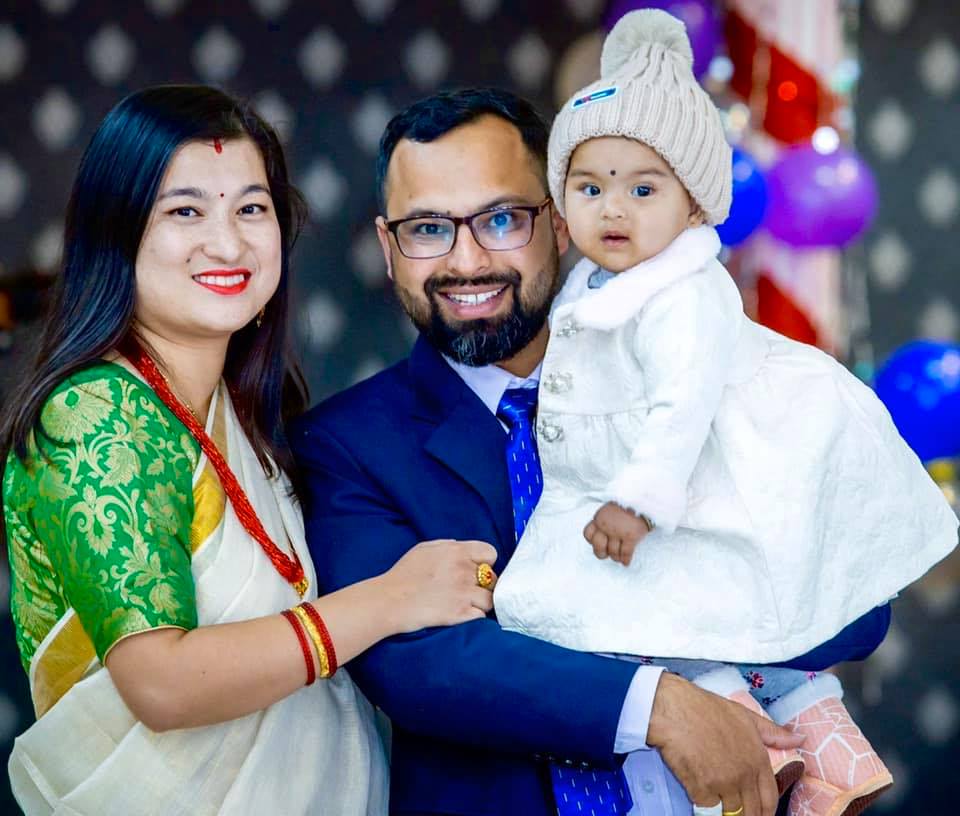 Poonam Maharjan with her husband Suman Lamichhane and daughter Joon
“The good thing is my husband fully supports this despite his belonging to a Brahmin family that practices strict menstrual rituals,” she says.
Her husband, Suman Lamichhane, says these rituals might have made some sense in the bygone days when women didn’t have the means to manage their periods properly. But now, with so many options and greater awareness, it serves no purpose.
“My wife doesn’t follow these rituals but we still seem to be in God’s good books and have a happy home,” he adds.
Poonam doesn’t see the need to make her periods public, which is what refraining from certain activities—like not going to the kitchen, not worshipping gods, etc.—does. Menstruation, for her, is already as inconvenient as it can get without further complicating it with societal and cultural constraints.
Nothing religious about it
According to historian Sujit Mainali, it’s not just Hindus who have menstrual rituals and taboos. There are some old tribal religions that practice it as well. Apart from the indigenous communities of Nepal and the Sikhs, most cultures follow some form of menstrual customs.
Mainali says there are two school of thoughts behind the age-old practices of menstrual taboos. First, the restrictions on women during menstruation supposedly ensured they got adequate rest, time to nourish their bodies, and paid attention to their hygiene. It was meant for a woman’s overall well-being.
“But this doesn’t make much sense. On one hand, you are saying it’s to make sure she’s in good health while on the other hand, you put her under several dietary restrictions and make her stay in a dark place,” says Mainali.
The second, more plausible reason is that menstruation indicated a woman’s reproductive status to her family and the community. This proved helpful in monitoring women’s sexual activities and thus prevented pre-marital sex and adultery.
Hence, from a sociological and anthropological viewpoint, the taboos were largely meant to contain, suppress, and dominate women.
“The reason they are there in our dharma shastras is to guarantee that women will follow these rules,” explains Mainali, adding that he has found no mention of any menstrual rituals in earlier Hindu religious texts but then there are some references to it in the Manusmriti.
Most women APEX spoke to said menstrual taboos were annoying and unnecessary. But most of them also confessed they couldn’t bring themselves to completely disregard them. The reason? They didn’t want to go against their family’s faith and tradition, feared hurting their mother’s feelings, and, for others, habits were difficult to break.
Amshu Dali, MD at Prakriti Bread, says she doesn’t enter the puja kotha and participate in pujas when on her period but that is because her family is religious and thus of a certain faith. Personally, she doesn’t see the logic behind the culture but follows it nonetheless to make her mother happy.
Poonam Maharjan with her husband Suman Lamichhane and daughter Joon
“The good thing is my husband fully supports this despite his belonging to a Brahmin family that practices strict menstrual rituals,” she says.
Her husband, Suman Lamichhane, says these rituals might have made some sense in the bygone days when women didn’t have the means to manage their periods properly. But now, with so many options and greater awareness, it serves no purpose.
“My wife doesn’t follow these rituals but we still seem to be in God’s good books and have a happy home,” he adds.
Poonam doesn’t see the need to make her periods public, which is what refraining from certain activities—like not going to the kitchen, not worshipping gods, etc.—does. Menstruation, for her, is already as inconvenient as it can get without further complicating it with societal and cultural constraints.
Nothing religious about it
According to historian Sujit Mainali, it’s not just Hindus who have menstrual rituals and taboos. There are some old tribal religions that practice it as well. Apart from the indigenous communities of Nepal and the Sikhs, most cultures follow some form of menstrual customs.
Mainali says there are two school of thoughts behind the age-old practices of menstrual taboos. First, the restrictions on women during menstruation supposedly ensured they got adequate rest, time to nourish their bodies, and paid attention to their hygiene. It was meant for a woman’s overall well-being.
“But this doesn’t make much sense. On one hand, you are saying it’s to make sure she’s in good health while on the other hand, you put her under several dietary restrictions and make her stay in a dark place,” says Mainali.
The second, more plausible reason is that menstruation indicated a woman’s reproductive status to her family and the community. This proved helpful in monitoring women’s sexual activities and thus prevented pre-marital sex and adultery.
Hence, from a sociological and anthropological viewpoint, the taboos were largely meant to contain, suppress, and dominate women.
“The reason they are there in our dharma shastras is to guarantee that women will follow these rules,” explains Mainali, adding that he has found no mention of any menstrual rituals in earlier Hindu religious texts but then there are some references to it in the Manusmriti.
Most women APEX spoke to said menstrual taboos were annoying and unnecessary. But most of them also confessed they couldn’t bring themselves to completely disregard them. The reason? They didn’t want to go against their family’s faith and tradition, feared hurting their mother’s feelings, and, for others, habits were difficult to break.
Amshu Dali, MD at Prakriti Bread, says she doesn’t enter the puja kotha and participate in pujas when on her period but that is because her family is religious and thus of a certain faith. Personally, she doesn’t see the logic behind the culture but follows it nonetheless to make her mother happy.
 Amshu Dali
Likewise, Shruti Dhungel, who works in the development sector, says she follows menstrual rituals but only when her mother is around. At home, with her husband, she couldn’t care less about touching the gods or doing whatever it is that her mother always told her she shouldn’t while on her period.
Amshu Dali
Likewise, Shruti Dhungel, who works in the development sector, says she follows menstrual rituals but only when her mother is around. At home, with her husband, she couldn’t care less about touching the gods or doing whatever it is that her mother always told her she shouldn’t while on her period.
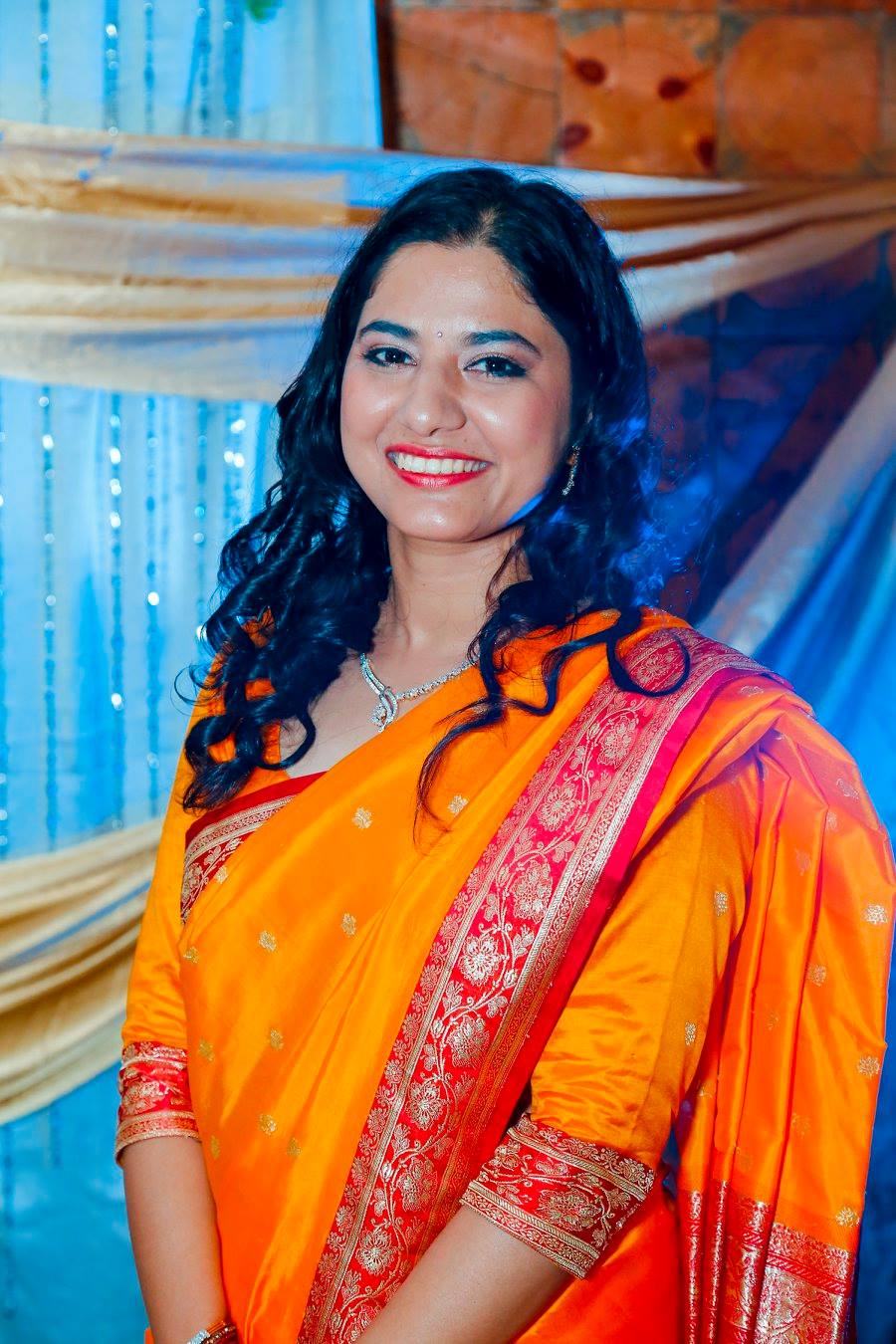 Shruti Dhungel
“I can’t suddenly expect my mother to accept ways that are in complete contrast to hers,” says Shruti. Her mother, she says, has also evolved a lot over the years and isn’t as stringent as she once was. She adds change is a gradual process and it can’t (and shouldn’t) be forced or rushed.
Ingrained habits
Dr Shreyashi Aryal, assistant professor, Obstetrics and Gynecology, at Lumbini Medical College Teaching Hospital, says certain things are engrained in her mind and behavior after years of conditioning. She still finds herself repeating those actions every time she has her menses.
Shruti Dhungel
“I can’t suddenly expect my mother to accept ways that are in complete contrast to hers,” says Shruti. Her mother, she says, has also evolved a lot over the years and isn’t as stringent as she once was. She adds change is a gradual process and it can’t (and shouldn’t) be forced or rushed.
Ingrained habits
Dr Shreyashi Aryal, assistant professor, Obstetrics and Gynecology, at Lumbini Medical College Teaching Hospital, says certain things are engrained in her mind and behavior after years of conditioning. She still finds herself repeating those actions every time she has her menses.
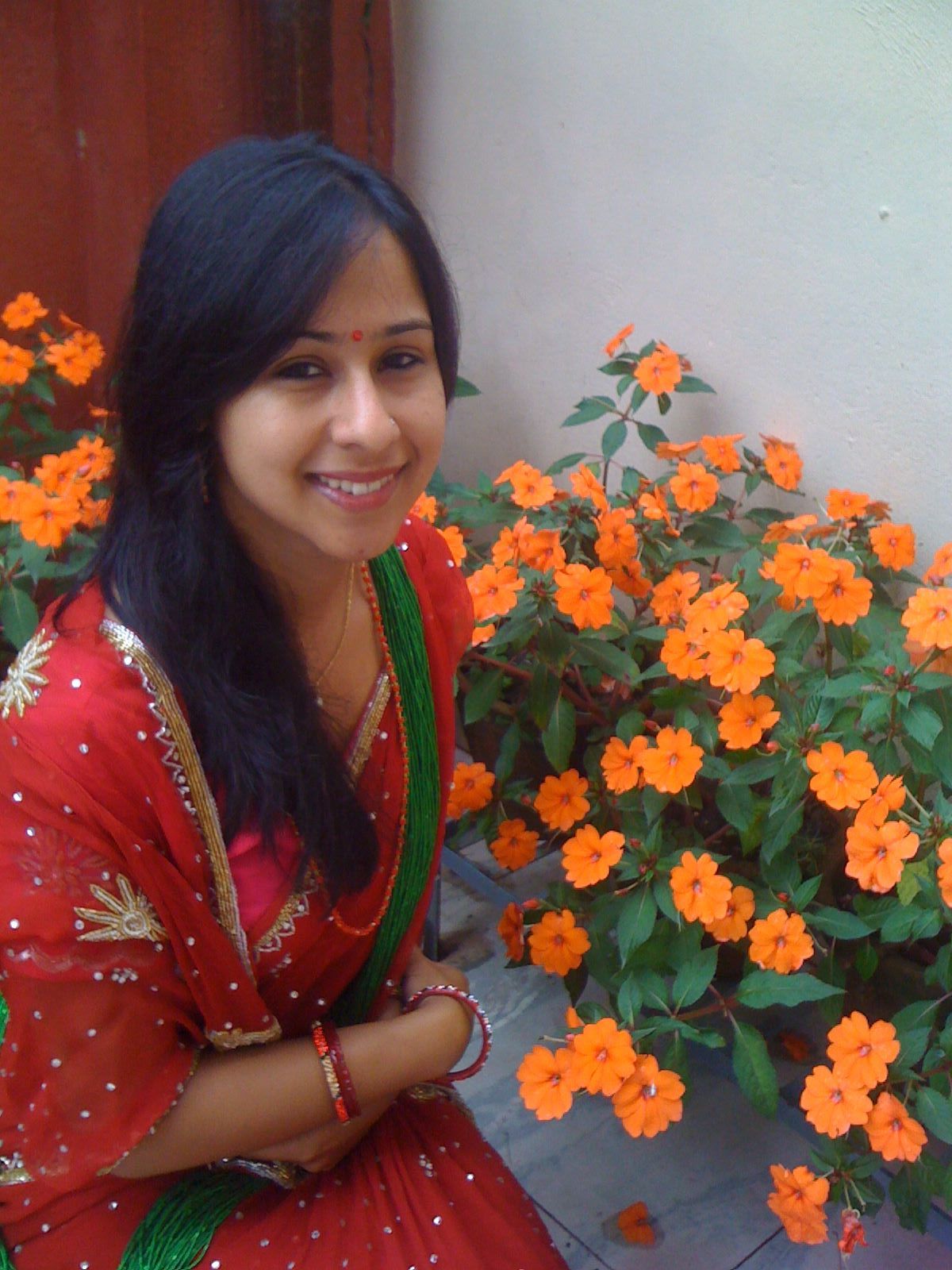 Shreyashi Aryal
Shreyashi was brought up in a strict Brahmin family and thus wasn’t allowed to do many things during her menses, which included entering the kitchen and touching fruit trees and her father.
“As I grew up, I understood all that wasn’t necessary but I didn’t rebel out of respect for my family norms,” she says. However, she adds that she won’t dictate what her daughter does or doesn’t do when she gets her periods. Instead, she will tell her that menstruation is purely physiological and that menstrual blood isn’t “impure”.
“I will see to it that she understands the religious, cultural, and scientific aspects of menstruation. What she chooses to do with the information will be entirely up to her,” she adds echoing Poonam’s sentiments.
However, Poonam says that apart from teaching her the basics of menstruation and its management, she will also teach Joon, her daughter, to challenge the culture that dictates she has to participate in a certain puja to seek forgiveness for menstruating.
Dr Neeti Aryal Khanal, lecturer of sociology, Tribhuvan University, says women have, for far too long, adopted a non-questioning attitude. It doesn’t help that they have to constantly negotiate their position and status in the society. In such a case, menstruation puts forth a social and moral dilemma.
For many, Dr Neeti argues, navigating social norms poses a constant challenge. She says women want to do what they want and keep their families happy, which are two, often mutually exclusive, goals.
“I’m against practices that regard menstruation as impure. This is where creation begins. But I can see why most women still follow these rituals,” she says. Forget rural women, Dr Neeti says, even urban women have many obligations that bind them. On a subconsciously level too, women try to avoid conflicts within the family.
Why hush-hush?
What’s worse, Amshu says, is that instead of embracing womanhood, we are taught to hide and be embarrassed about getting our periods.
And indeed, menstruation has always been a hushed affair. From the shopkeeper discreetly wrapping a packet of sanitary pads in newspaper to girls tying sweaters around their waists to hide the most miniscule of stains, the society seems to have made it clear that it’s something to be ashamed of.
Satya Prakash Dhungana, a pranacharya, says even our dharma shastras don’t regard menstruation as something unclean.
“It does recommend that women keep themselves physically clean during their time of the month, but it isn’t considered unholy,” he says.
Dhungana stresses on the need to be practical and not make pointless rules in the name of religion. He adds that women can do what they are comfortable with—what their heart allows them to do free of guilt.
Dr Neeti feels the same way. You shouldn’t change for the sake of change, or because your friends think menstrual rituals are nonsensical. But neither can you give continuity to something that you feel is unnecessary for the sake of the society. But, most important, you shouldn’t judge others for their choices because, as Dr Neeti puts it, this is tricky course to navigate.
“So, what do you do? You do exactly what you feel is right, what your conscience permits you to do,” she concludes.
Shreyashi Aryal
Shreyashi was brought up in a strict Brahmin family and thus wasn’t allowed to do many things during her menses, which included entering the kitchen and touching fruit trees and her father.
“As I grew up, I understood all that wasn’t necessary but I didn’t rebel out of respect for my family norms,” she says. However, she adds that she won’t dictate what her daughter does or doesn’t do when she gets her periods. Instead, she will tell her that menstruation is purely physiological and that menstrual blood isn’t “impure”.
“I will see to it that she understands the religious, cultural, and scientific aspects of menstruation. What she chooses to do with the information will be entirely up to her,” she adds echoing Poonam’s sentiments.
However, Poonam says that apart from teaching her the basics of menstruation and its management, she will also teach Joon, her daughter, to challenge the culture that dictates she has to participate in a certain puja to seek forgiveness for menstruating.
Dr Neeti Aryal Khanal, lecturer of sociology, Tribhuvan University, says women have, for far too long, adopted a non-questioning attitude. It doesn’t help that they have to constantly negotiate their position and status in the society. In such a case, menstruation puts forth a social and moral dilemma.
For many, Dr Neeti argues, navigating social norms poses a constant challenge. She says women want to do what they want and keep their families happy, which are two, often mutually exclusive, goals.
“I’m against practices that regard menstruation as impure. This is where creation begins. But I can see why most women still follow these rituals,” she says. Forget rural women, Dr Neeti says, even urban women have many obligations that bind them. On a subconsciously level too, women try to avoid conflicts within the family.
Why hush-hush?
What’s worse, Amshu says, is that instead of embracing womanhood, we are taught to hide and be embarrassed about getting our periods.
And indeed, menstruation has always been a hushed affair. From the shopkeeper discreetly wrapping a packet of sanitary pads in newspaper to girls tying sweaters around their waists to hide the most miniscule of stains, the society seems to have made it clear that it’s something to be ashamed of.
Satya Prakash Dhungana, a pranacharya, says even our dharma shastras don’t regard menstruation as something unclean.
“It does recommend that women keep themselves physically clean during their time of the month, but it isn’t considered unholy,” he says.
Dhungana stresses on the need to be practical and not make pointless rules in the name of religion. He adds that women can do what they are comfortable with—what their heart allows them to do free of guilt.
Dr Neeti feels the same way. You shouldn’t change for the sake of change, or because your friends think menstrual rituals are nonsensical. But neither can you give continuity to something that you feel is unnecessary for the sake of the society. But, most important, you shouldn’t judge others for their choices because, as Dr Neeti puts it, this is tricky course to navigate.
“So, what do you do? You do exactly what you feel is right, what your conscience permits you to do,” she concludes.
The case against capital punishment in Nepal
An APEX Facebook post asking what people thought about capital punishment for rape saw replies in its favor. One respondent was upset enough to inquire, “Are you kidding, a rapist is allowed to take everything from a woman and we are actually debating whether he deserves capital punishment?” A related poll had 84 percent respondents voting yes for death for rapists. Recently, many women parliamentarians formed a loose network to lobby for stricter rape laws, including the provision of death penalty.
According to Nepal Police data, 1,480 rape cases were recorded in the fiscal year 2017/18 while the number rose to 2,144 in 2019/20. A vast majority seems to believe that for a crime as heinous as rape, the only fit punishment is sentencing the culprit to death. Nothing less will do.
But people clamoring for capital punishment are being driven by their emotions, say those who are against death-penalty’s reinstatement. Those in its favor fail to see how it will not be an effective deterrent for rape. But it might as well be argued that the attitude of eye for an eye, which is essentially what sentencing someone to death is, will only negate the years of progress we have made as a democratic society.
Better implementation of laws
Sabitra Dhakal, a human rights activist, believes capital punishment will institutionalize violence. Besides being a gross rights violation, sentencing someone to death, however horrifying the crime, is a regressive approach for a society and its legal system.
_20201010114811.jpg)
According to her, capital punishment isn’t a solution also because it puts more power in the hands of those who are already powerful and victimizes those who don’t have the means to get a good legal representation.
“Rather than bringing another legislation, the laws we now have should be better implemented,” says Dhakal, adding that some women parliamentarians, by asking for capital punishment, are looking for an easy way out. The alternative, Dhakal says, which comprises of a societal and systemic overhaul, seemingly requires too much work.
Nepal is a signatory of the UN convention, the ICCPR, which ensures people’s civil and political rights. One of its protocols is the abolition of death penalty. That aside, our constitution prohibits it as well. The guiding thought here is that capital punishment is a barbaric act.
Anecdotal evidences suggest death penalty doesn’t stop crimes, or more specifically in this case, capital punishment won’t put an end to rapes—rather the opposite.
We don’t have to look far either.
On 14 September 2020, a 19-year-old Dalit woman was gang-raped by four men in Hathras district in Uttar Pradesh, India. The woman died two weeks later. This incident came mere six months after the four convicts in Nirbhaya gang rape-and-murder were hung to death in March 2020.
Counsellor Geeta Neupane of the Women’s Foundation of Nepal strongly opposes the death penalty, which, she says, is a systemic instigator of violence contributing to a chain reaction of revenge. Neupane reiterates Dhakal’s sentiments when she says the best way to tackle rape would be stronger implementation of existing laws.
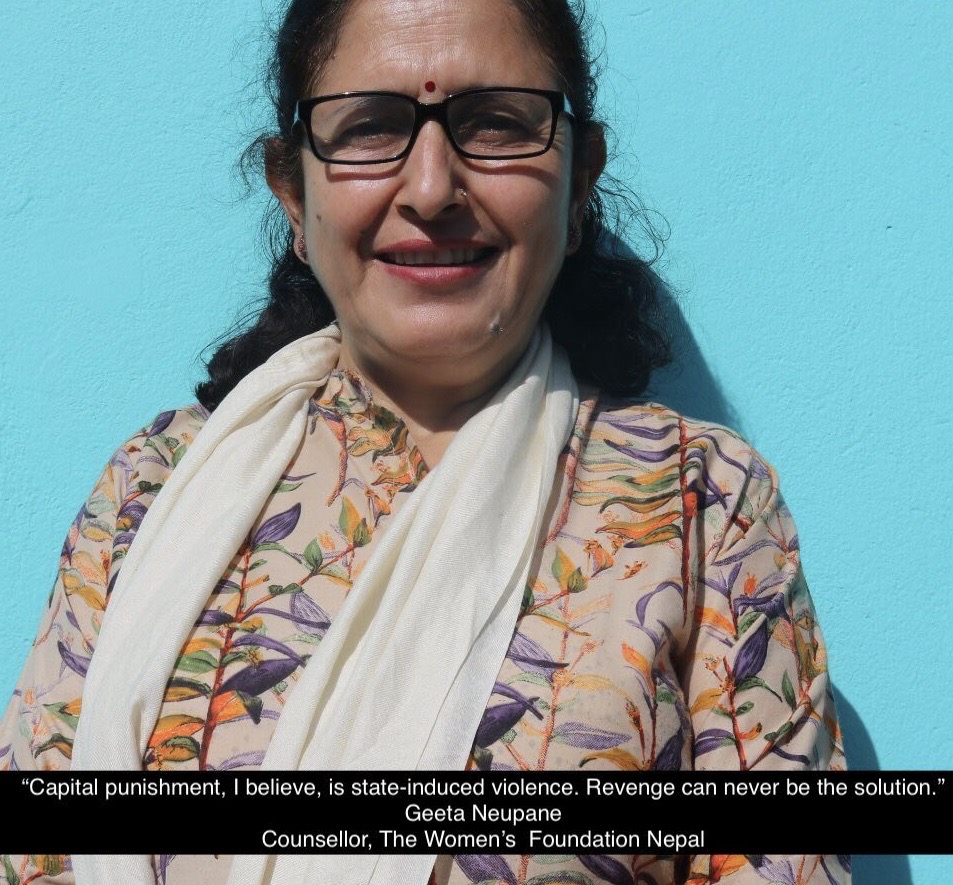
“We have stern laws for rapes and other atrocious offences. It’s just that there are many loopholes and corruption. Unfortunately, there is politics in everything,” says Neupane.
Efficient and effective legal system
Advocate Rahul Chapagain believes Nepal isn’t mature enough to handle capital punishment. If a country allows death penalty then all its other regulatory bodies—the investigative agencies, medical teams, and judiciary—need to be efficient and effective as well. Otherwise, it will be difficult to establish a crime and determine whether the accused is actually guilty.
_20201010114813.jpg)
“Rape cases are handled negligently in Nepal. There is no proper evidence collection and preservation, in terms of medical examination and photographs. What you usually have is a complaint and a writeup by the police stating the types of superficial wounds the victim had on her body,” says Chapagain.
This, he adds, makes it next to impossible for the justice system to ascertain that a crime has been committed and that the accused is the culprit beyond reasonable doubt.
According to advocate Ishan Raj Onta, media trials pose another grave challenge. Apart from having meticulous regulatory bodies, the media must also exercise control and be governed by a certain code of conduct. Sadly, that isn’t always the case.
_20201010114756.jpg)
“The media is quick to portray someone as guilty even in an ongoing investigation. This can cloud people’s judgement. How can capital punishment be a recourse in such a scenario?” he asks.
Another argument against reinstating capital punishment is that our justice system is retributive and reformative—operating under the principle that criminals too need to be given a second chance. The idea behind life imprisonment or a jail sentence in general is not only to punish someone but to make the prisoner realize his/her mistakes and change.
Raunaq Singh Adhikari, an advocate with Kantipur Law Associates, believes people—hardened criminals included—can change, given a chance. Besides, right to life is a fundamental right that no one can take away from you. Adhikari adds that fear of punishment, however harsh, cannot make someone think rationally and morally when impulse takes over.
_20201010114817.jpeg)
Punishment alone won’t stop rape
Activist Dhakal says capital punishment is reactive. What we should instead focus on are preventive measures if our goal is to cut back on and eventually stop the incidents of rapes and murders.
“It’s important to understand that punishment alone doesn’t address the root cause of crime,” says Onta. He adds that if the idea is to dish out maximum suffering to the perpetrator, as those lobbying for capital punishment claim, then death penalty actually doesn’t serve the purpose.
“Wouldn’t you rather have the culprit jailed for life? Capital punishment means his suffering will end in a few minutes,” he says.
However, Onta says that curbing rape isn’t something that should be dealt with in isolation. There many other factors to be kept in mind.
“Rape isn’t a new issue. It’s been there since the start of civilization. If we are to ever put an end to it, the reform must start from home and very early on,” he says.
Onta attributes rapes and gender-based violence to the society’s stringent gender roles. In our patriarchal society, it’s not uncommon for men to feel inherently superior.
Sanjita Timsina, a senior program coordinator at WOREC Nepal, says the way society looks at women—as the weaker sex—is largely the reason behind rapes. Raping someone shows you have no respect for that person. It’s a power play, she says. Chapagain agrees, claiming he has witnessed instances where the culprit seemed surprised to know he had committed a crime.

“It might sound strange but many men who rape seem to have no idea that it’s wrong to force yourself on someone. There’s simply no awareness. Many have the mindset that women need to comply with their wishes and demands, that they should be subservient,” he says.
To tackle this, boys and girls, Onta says, should be allowed to socialize and intermingle as early as possible without being made to behave a certain way because of their gender.
Neupane, the counsellor, adds it all boils down to raising your sons a little differently, telling them to respect the opposite sex, and teaching them the values of equality and acceptance in their formative years.
Certainty of punishment rather than severity
Apart from exploring long-term solutions, our legal system should also better protect women and rape victims.
It’s sad that victims often get blamed for the crimes—‘She must have said or done something to instigate violence’, ‘She shouldn’t have been out alone at that hour’, ‘And why wasn’t she “modestly” dressed?’ It’s this victim-blaming mindset that leads, first, to less reporting of the crime, and second, makes life after rape all the more miserable for the victim as well as her family. A fast track hearing process that doesn’t subject the victim to harassment and making the law more women-friendly could be the way out.
Advocate Aparmita Shakya says there will continue to be rapes so long as rapists don’t fear or hold the country’s law enforcement mechanism in high regard, and think they will get away with no more than a slap on their wrist.
_20201010115436.jpg)
“It’s not the severity of the sentence but the assurance that punishment will be meted out, and on time, that will deter rapes,” she says.
Manju Khatiwada, undersecretary, National Human Rights Commission, agrees with Shakya and reemphasizes the need for an unbiased legal system that guarantees punishment.
_20201010114806.jpg)
“Criminals often have a kind of ‘I-know-people-in-right-places’, and ‘I-can-get-away-with-this’ attitude, which are made worse by the fact that our legal system takes a long time to prosecute the guilty,” says Khatiwada.
She adds that she is against capital punishment not only because it violates basic human rights but also because there have been many cases, elsewhere in the world, where people have been wrongly punished.
“The loss of an innocent human life is irreparable,” she says. “Killing every person who rapes a woman isn’t the solution. For that will fuel hatred and create an unruly society.”
Take responsibility of our women
Pushpa Bhusal, a federal parliamentarian, says the country has to create a favorable environment for rape victims to report the crime and assure them justice. It’s unsettling to see how Nepal has failed its women, she says.
_20201010114813.jpg)
“We need better mechanisms because the ones we now have aren’t working,” she says, explaining the rationale behind forming a loose taskforce to look into laws on rapes and gender-based violence.
“One of our arguments is that if the victim is a minor then the rapist should get capital punishment. But it’s not a stand-alone argument. We are first urging the country to do everything in its power to ensure women’s safety. But if nothing can stop rapes, then reinstating the death penalty can be an alternative,” she says.
But Timsina of WOREC Nepal is sure we don’t have to go that far. “One thing we can do is throw out the 35-day limitation on lodging an FIR,” she says. What usually happens because of this limitation, Timsina says, is that there is a lot of mediation in that time. The victim is often put under pressure to keep quiet and given many assurances. Things get drastically worse for rape victims when the statute of limitation expires.
The solution, experts believe, lies not in increasing the harshness of punishment but in establishing a system where each department that looks into the crime does its job fairly, on time, and with unwavering focus. Another important aspect would be to create conditions where the rape victim isn’t stigmatized and justice is assured.
As Onta puts it, curbing rapes is a philosophical discourse with many social and legal aspects to it. There isn’t a one-size-fits-all solution.
Behind the scenes of Nepali online businesses
For a while now, you have been toying with an idea. You are tempted to develop it into an online business. Everybody seems to be doing it. Why can’t you too? After all, what have you got to lose? Unlike a brick and mortar business, you don’t need to invest a lot and can start small. Yet, in your heart of hearts, you know you might never take the plunge.
Would you be more daring if you knew how an idea could snowball into a profitable online business? If those already doing it shared their tricks of the trade?
Phoebe Bhattarai, founder of Organic Originals which produces natural beauty products, says you shouldn’t hesitate to ask for help, should you feel the need for it. When Bhattarai launched her company in 2019, she confesses she took on too much and quickly got overwhelmed.
_20200926125845.jpg)
“It’s not unusual for you to try and do everything yourself when you start an online business. But there are so many aspects to it that you won’t be able to manage alone,” she says.
_20200926125847.jpg)
Bhattarai says she would have given up had some of her friends not pitched in to help—one of them, Ayush Pant, is currently a partner in the company. Today, Organic Originals is a four-member team: two work in product manufacture, one looks after the company’s social media, and there’s a designated person for delivery. This has made work a whole lot easier and efficient.
Now, Bhattarai can focus on expanding her clientele.
“Initially, there were some misunderstandings with some of our clients. I realized it was largely because, without direct contact, we weren’t able to communicate with them properly,” she says.
Delays are also sometimes inevitable as it’s difficult to procure ingredients needed to make a product. There are issues with the packaging system as well since Organic Originals outsources the bottles and boxes final products come in.
“What’s imperative is you are able to iron out these glitches by communicating with your clients and suppliers,” says Bhattarai.
Customer satisfaction the top priority
Darpan Neupane, founder of the online bookstore Bookmandu, says online businesses can thrive only if your customers believe you can give them good service. Timely delivery is one key indicator of good service.
_20200926125846.jpg)
While delivery within Kathmandu isn’t a problem, Neupane laments poor postal services often hamper their business outside the valley. Lack of payment options mean people opt for cash on delivery, which isn’t always feasible when you offer nationwide services.
To counter this problem, Bookmandu is working on its own website as well as an Android app with order tracking system. Neupane believes this will increase the credibility of his company and people will be willing to make online payments while placing orders.
Customer satisfaction seems to be a priority among many online business operators. A small market and tough competition make it immensely difficult for online businesses to flourish. Much depends on word of mouth and for that, it’s important that every customer is happy.
This is why Tapashya Dhakal, owner of The Brand Goodies that makes customized gift boxes according to your needs and budget, likes to play it safe and only collaborates with companies providing top-notch quality items.
_20200926125847.jpg)
“That’s the reason why we currently have limited options. We want to ensure that you are getting your money’s worth,” she says.
Rupesh Kumar Jha, MD, Groomin, a designer mask company, agrees that a lot of attention needs to go into maintaining the quality of your products and services to gain customers’ trust. You also have to be willing to cater to their changing demands.
(1)_20200926150132.jpg)
“There will be problems. Business is hard work. But you have to devise clever solutions and work your way through the problems,” says Jha. Groomin was launched during the nationwide lockdown in May 2020, and Jha says business has been good despite the fact that it’s currently not possible to promote Covid-19-related items on Facebook and Instagram.
It’s fairly easy to start an online business in the age of Instagram. You have a product or service to offer? Simply upload some photos and get the word out there. The allure of shopping online has also increased due to the pandemic that has most of us trying to minimize contact. Also, online shopping is convenient, and who doesn’t love getting what they want with minimal effort?
Be ready to sweat it out
But if your business is to gain a foothold in the market, you have to be ready to put in some serious work, says Lasata Bajracharya. She, along with Sayuj Shrestha, runs Kharayo, maker of phone cases and accessories.

“There are many opportunities in online business, especially in Nepal where it’s just starting to gain momentum. But how well your business does depend on the effort you put in and the value your company adds in people’s lives,” she says.
There are multiple pages on social media for anything you could possibly want. From food, clothes, and household items to books, beauty products and accessories, you want something, rest assured it’s available online. So, if you are an online business, how do you stay on top of the game?
Animal rights activist Anish Tuladhar, co-founder of Sarabakesvegan, which makes customized vegan cakes, says it’s important to be clear about what you are trying to accomplish while launching an online business. If you are doing it to promote a cause—as are Tuladhar and his business partner, Saraswati Rashmi Shakya—you will have a certain approach. If profit is your goal, then you will have to be rigorous about promoting and marketing your products or services.
_20200926125845.jpg)
“Either way, you will have to put in a lot of effort to develop your brand,” he says.
Bajracharya vouches for this too. She spends a lot of time on social media trying to interact with and engage her customers and thus give her brand the visibility it needs even when Kharayo has no new products to promote.
“I noticed that if there was no activity on the company social media page for a few days, we often lost a few followers,” she says, adding it’s crucial to hold on to your customers’ attention while running an online business.
Buying online, and paying for it
There are many other challenges an online business operator faces. Every day brings a new set of problems. A major issue in Nepal is definitely payment-related, as the concept of online transactions hasn’t fully set in. Most people are uncomfortable with the idea of paying for something before receiving it while others don’t want to share bank-card details.
Dhakal mentions that this limits a brands’ customer base and hampers its international prospects. She feels the government should devise ways to make online payments easy, accessible, and secure. This, she says, could facilitate import/export and, in turn, boost the economy.
She further adds that the government should also look into easing the registration process of online businesses and making clear regulations regarding the same.
Another issue is that people still aren’t used to online shopping. Many prefer to see and hold something before deciding whether to buy it. Even Dhakal who runs an online business says she isn’t sold on the idea of shopping for clothes over the internet. She would rather try on a piece of clothing than just see its specifications before making a purchase.
“Here, I feel, it boils down to the quality of your service. People are more likely to give you a chance if you can provide satisfaction guarantees or have an exchange or money-back policy,” says Bajracharya.
The overhead cost is low, you have the freedom to work on your own terms, and you can experiment and take risks without fearing harsh repercussions while running an online business. The pros definitely outweigh the cons, agree online business owners APEX spoke to. Success isn’t guaranteed but you won’t incur huge financial losses either.
However, Bhattarai recommends you get an office space so that work isn’t on your mind 24/7. You can get up, have a nice breakfast, and go to work. When you come back home, you can relax and recharge. That way, she says, you ensure a work-life balance that’s necessary for a healthy, ideating, creative, and problem-solving mind.
“You don’t want to be surrounded by boxes and piles of stuff from the moment you wake up or be thinking about work all the time. So, I feel, a separate workspace is a must. But this is a personal choice. You do what works for you,” she concludes.














